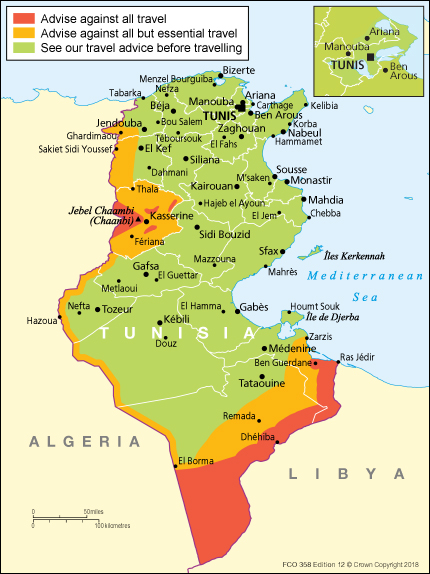Tunisia - travel advice from the Foreign Office
Summary

The Foreign and Commonwealth Office (FCO) advise against all travel to:
- the Chaambi Mountains National Park and the designated military operations zones of Mount Salloum, Mount Sammamma and Mount Mghila
- the militarised zone south of the towns of El Borma and Dhehiba
- within 20km of the rest of the Libya border area north of Dhehiba
- the town of Ben Guerdane and immediate surrounding area
The FCO advise against all but essential travel to:
- all other areas within 75km of the Libyan border, including Remada, El Borma and the town of Zarzis
- the governorate of Kasserine, including the town of Sbeitla
- within 10km of the border with Algeria south of Kasserine governorate
- within 30km of the border in El Kef and Jendouba governorates south of the town of Jendouba, including the archaeological site of Chemtou
- areas north and west of the town of Ghardimaou in Jendouba governorate
Following the death of Iranian General Qasem Soleimani in a US strike in Baghdad on 3 January, the incident has led to increased tensions in the region. There is a possibility of an increased threat against Western interests and the security situation could worsen with little warning. You should remain vigilant and keep up to date with the latest developments, including via the media and this travel advice.
A nationwide state of emergency, first imposed after a suicide attack on a police bus on 24 November 2015, remains in place.
Since the terrorist attack in Sousse in June 2015, which targeted tourists, the UK government has been working closely with the Tunisian authorities to investigate the attack and the wider threat from terrorist groups. The Tunisian government has improved protective security in major cities and tourist resorts.
But terrorists are still very likely to try to carry out attacks in Tunisia, including against UK and Western interests. Security forces remain on a high state of alert in Tunis and other places. You should be vigilant at all times, including around religious sites and festivals. Crowded areas, government installations, transportation networks, businesses with Western interests, and areas where foreign nationals and tourists are known to gather may be at higher risk of attack. You should be particularly vigilant in these areas and follow any specific advice of the local security authorities. In more remote areas of the country, including tourist sites in southern Tunisia, security forces’ response times to an incident may vary. Follow the advice of the Tunisian security authorities and your travel company if you have one. See Terrorism
Demonstrations often occur in Tunisia and the majority are peaceful. However, you should avoid all areas of demonstrations, and exercise caution if in the vicinity of any large gatherings or protests.
You can contact the emergency services by calling 197 (police - when in cities and towns), 193 (national guard - when in rural areas or small villages), 190 (ambulance) or 198 (civil protection - for assistance at incidents, such as car accidents, to provide medical assistance and response to fire).
If you’re abroad and you need emergency help from the UK government, contact the nearest British embassy, consulate or high commission. Consular support may be limited in parts of Tunisia.
Take out comprehensive travel and medical insurance before travelling.



